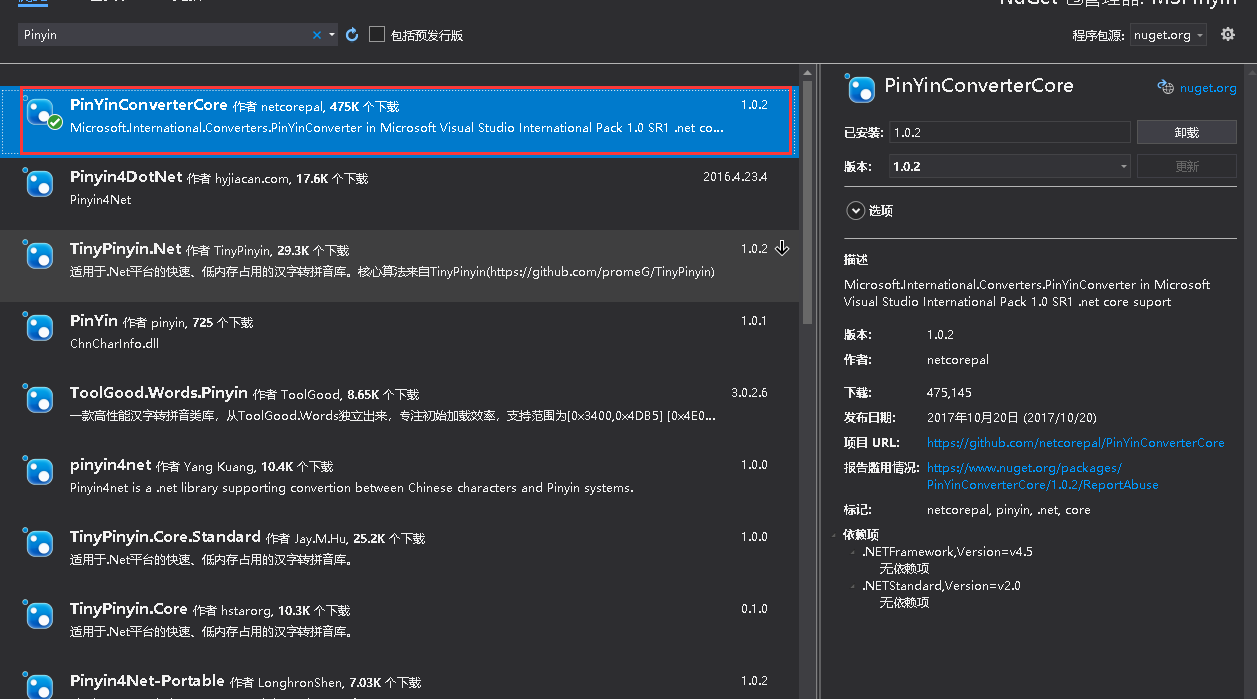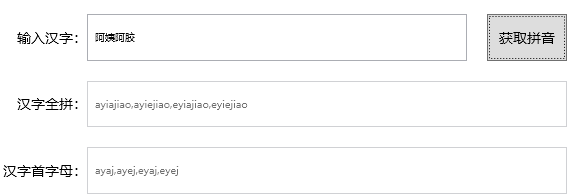C#汉字转汉语拼音
一、使用PinYinConverterCore获取汉语拼音
最新在做一个搜索组件,需要使用汉语拼音的首字母查询出符合条件的物品名称,由于汉字存在多音字,所以自己写查询组件不太现实,因此,我们使用微软提供的CHSPinYinConv,CHSPinYinConv在.net core下载安装没有问题,但在.net framework会由于兼容性会安装失败,因此使用了PinYinConverterCore来实现汉字转拼音,PinYinConverterCore应该也是基于CHSPinYinConv开发的兼容包,后续的代码两个安装包环境下都可以使用。使用Nuget搜索PinYinConverterCore下载并安装,具体如下:

二、编写工具扩展类实现获取汉字的拼音
由于汉字存在多音字,因此,通过汉字获取到的拼音是一个数组,具体如下:
/// <summary>
/// 汉字转换拼音
/// </summary>
public static class PingYinUtil
{
private static Dictionary<int, List<string>> GetTotalPingYinDictionary(string text)
{
var chs = text.ToCharArray();
//记录每个汉字的全拼
Dictionary<int, List<string>> totalPingYinList = new Dictionary<int, List<string>>();
for (int i = 0; i < chs.Length; i++)
{
var pinyinList = new List<string>();
//是否是有效的汉字
if (ChineseChar.IsValidChar(chs[i]))
{
ChineseChar cc = new ChineseChar(chs[i]);
pinyinList = cc.Pinyins.Where(p => !string.IsNullOrWhiteSpace(p)).ToList();
}
else
{
pinyinList.Add(chs[i].ToString());
}
//去除声调,转小写
pinyinList = pinyinList.ConvertAll(p => Regex.Replace(p, @"\d", "").ToLower());
//去重
pinyinList = pinyinList.Where(p => !string.IsNullOrWhiteSpace(p)).Distinct().ToList();
if (pinyinList.Any())
{
totalPingYinList[i] = pinyinList;
}
}
return totalPingYinList;
}
/// <summary>
/// 获取汉语拼音全拼
/// </summary>
/// <param name="text">The string.</param>
/// <returns></returns>
public static List<string> GetTotalPingYin(this string text)
{
var result = new List<string>();
foreach (var pys in GetTotalPingYinDictionary(text))
{
var items = pys.Value;
if (result.Count <= 0)
{
result = items;
}
else
{
//全拼循环匹配
var newTotalPingYinList = new List<string>();
foreach (var totalPingYin in result)
{
newTotalPingYinList.AddRange(items.Select(item => totalPingYin + item));
}
newTotalPingYinList = newTotalPingYinList.Distinct().ToList();
result = newTotalPingYinList;
}
}
return result;
}
/// <summary>
/// 获取汉语拼音首字母
/// </summary>
/// <param name="text"></param>
/// <returns></returns>
public static List<string> GetFirstPingYin(this string text)
{
var result = new List<string>();
foreach (var pys in GetTotalPingYinDictionary(text))
{
var items = pys.Value;
if (result.Count <= 0)
{
result = items.ConvertAll(p => p.Substring(0, 1)).Distinct().ToList();
}
else
{
//首字母循环匹配
var newFirstPingYinList = new List<string>();
foreach (var firstPingYin in result)
{
newFirstPingYinList.AddRange(items.Select(item => firstPingYin + item.Substring(0, 1)));
}
newFirstPingYinList = newFirstPingYinList.Distinct().ToList();
result = newFirstPingYinList;
}
}
return result;
}
}
三、编写测试用例
我们编写一个测试用例,通过输入的汉字获取到汉语拼音的全拼和首字母缩写,具体如下:
// 汉字输入
string text = TextBoxInput.Text;
// 获取到汉语拼音的全拼
TextBoxTotal.Text = string.Join(",", text.GetTotalPingYin());
// 获取到汉语拼音的首字母
TextBoxFirst.Text = string.Join(",", text.GetFirstPingYin());

我们编写录入一组用户名,然后根据输入输入的用户名的缩写,筛选出符合条件的人,我们可以使用Linq模糊查询,具体如下:
public class Student
{
public string Name { get; set; }
public List<string> Pinyin { get; set; }
}
StudentList = new List<Student>
{
new Student() {Name = "张三"},
new Student() {Name = "章黎"},
new Student() {Name = "张三丰"},
new Student() {Name = "李四"},
new Student() {Name = "王五"},
new Student() {Name = "John"},
new Student() {Name = "W.吴"},
new Student() {Name = "阿姨"},
new Student() {Name = "阿胶"},
new Student() {Name = "麦合苏提.麦合苏提"}
};
var text = TextBoxSearch.Text;
foreach (var student in StudentList)
{
student.Pinyin = student.Name.GetFirstPingYin();
}
StudentList = StudentList.Where(s => s.Pinyin.Exists(p=>p.Contains(text))).ToList();



